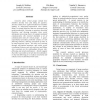Free Online Productivity Tools
i2Speak
i2Symbol
i2OCR
iTex2Img
iWeb2Print
iWeb2Shot
i2Type
iPdf2Split
iPdf2Merge
i2Bopomofo
i2Arabic
i2Style
i2Image
i2PDF
iLatex2Rtf
Sci2ools
HICSS
2005
IEEE
2005
IEEE
The Rules of Virtual Groups
Concerns about virtual groups include how members develop trust and liking for partners. Previous studies have explored behavioral variables leading to subjectively-experienced trust and/or liking, or trusting behaviors that are associated with group productivity. Drawing on practices described elsewhere and deriving principles from social information processing theory of computer-mediated communication, this research identified a set of communication rules for virtual groups. A quasiexperimental procedure promoted variance in rule following behavior, allowing assessment of rules in an inter-university course. Six rules were assessed through self-reported measures, and results reveal correlations between each rule and trust and liking. Less consistent are the relationships between rulefollowing and actual performance. Results suggest that either a powerful set of rules has been identified, or that rule-following per se reduces uncertainty and enhances trust in distributed work teams.
Biometrics | HICSS 2005 | Members Develop Trust | System Sciences | Trust And/or Liking | Virtual Groups |
Related Content
| Added | 24 Jun 2010 |
| Updated | 24 Jun 2010 |
| Type | Conference |
| Year | 2005 |
| Where | HICSS |
| Authors | Joseph B. Walther, Ulla Bunz, Natalia N. Bazarova |
Comments (0)

